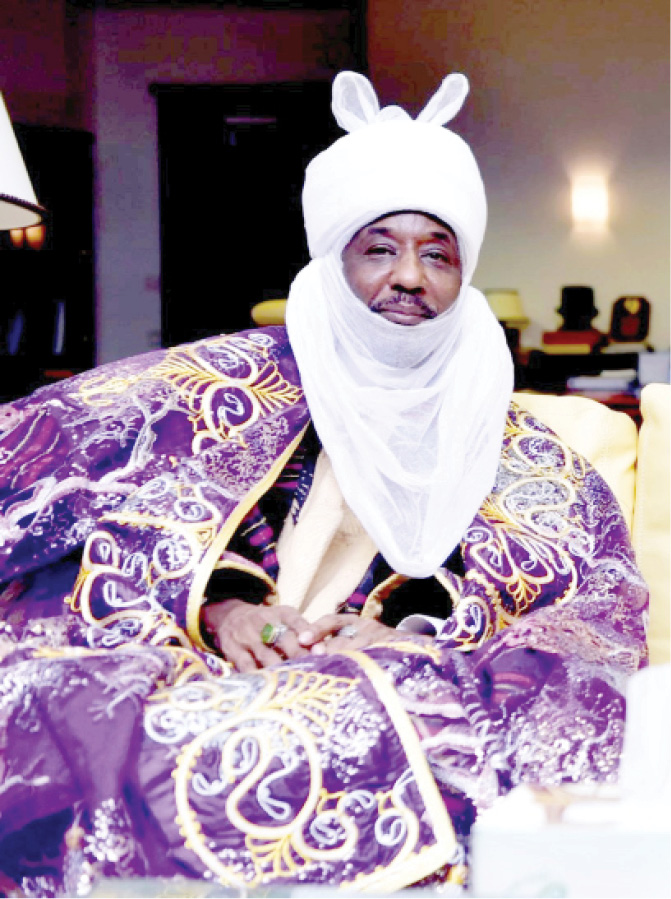The news, for most of last week, was not what the federal and state governments were doing to reduce the biting economic hardships millions of Nigerians were, and are still, facing but a long statement on both social and mainstream media by the 14th Emir of Kano Muhammadu Sanusi II, now Khalifa Sanusi Lamido Sanusi, to the effect that Nigerians should not blame President Bola Ahmed Tinubu’s administration for the current hardships in the country because they are due mainly to the bad policies of former President Buhari’s government.
According to a version of it in the Punch of Monday last week, titled “Tinubu administration not responsible for economic hardship – Sanusi”, the former CBN governor was quoted to have said, among other similar things, that: “It’s injustice for anyone to blame the Tinubu administration for the current economic hardship because there is no other alternative than the removal of the fuel subsidy. After all, Nigeria cannot even afford to pay the subsidy. In the last eight years, the Central Bank of Nigeria continued to print more money, and the naira continued to depreciate.”
In other words, according to HRH Sanusi, Nigerians should hold Buhari and his government squarely responsible for why a measure of rice now sells for about N2000 and why the value of the naira has fallen to unprecedented levels. Really?
For me, former CBN Governor Sanusi could have been speaking as an activist public intellectual, who throughout his career as a student, university lecturer, banker, public official and traditional ruler, has always intervened in national matters by speaking truth to power as he understands it, regardless who is happy or not by what he says. He could also have been speaking specifically as an economist and a former Governor of the Central Bank of Nigeria (CBN) who had first-hand insider information about the issues of which he speaks. To his credit, HRH Sanusi has been a staunch supporter of subsidy removal for most of the past decade. And in that respect, HRH Sanusi is unlike President Tinubu himself, who was once Nigeria’s Opposition-in-Chief now turned Subsidy Remover-in-Chief.
But it is also possible that, either knowingly or inadvertently, the former CBN governor was speaking as part of that growing chorus of voices who hold former President Buhari and his government responsible for most of the difficulties now being faced by his successor, President Tinubu, particularly with respect to the economy and security. Whether the Khalifa intended it as such or not, his statement falls squarely within the purview of the feeble blame game by Tinubu’s officials against Buhari in relation to the current situation of things in Nigeria.
That is the problem because the statement that, “It is injustice for anyone to blame the Tinubu administration for the current economic hardship” in Nigeria is itself an injustice. It is unfair to Buhari, and also unfair to Tinubu. And above all, it is unfair to the truth, viewed either in economic or political terms.
It is unfair to Buhari in at least two respects. First, it is true that the Buhari government borrowed heavily from both local and international sources, most notably from CBN’s ways and means advances. But the situations that necessitated the borrowing were not all of Buhari’s making. I am often surprised that Nigerians forget the country’s economic situation when Buhari assumed office. Things could not have been worse for Nigeria on the economic front in 2015.
In 2015/2016, oil prices had collapsed from over $100 per barrel to less than $30, dramatically reducing government revenues by over 70 per cent. Also, because fuel importation was based on a rather fraudulent daily consumption average, subsidy payments were mounting. Worse still, little of the gains of high oil prices during 2009 –2014 remained, lavished as they were by the Jonathan government. As a result, many states could not pay salaries, even though the economies of at least 30 states depend almost entirely on the salaries paid by state governments.
That the Buhari government borrowed to, among other things, bail out the states and prevent a national economic catastrophe – which could have been worse than today’s –was clearly justified. We can, and should, demand full accountability from Buhari and his government for what was borrowed, as we should for any other government’s borrowings, but some of the borrowings made sound political and economic sense. The real reason Nigeria is where we are today with both the subsidy and currency issues is that we wasted a golden opportunity to develop full domestic refining capacity and end fuel importation during 2009 – 2014 when oil prices were at their highest ever in the history of the commodity. It, therefore, amounts to standing history on its head to now blame Buhari alone.
Needless to say, HRH Sanusi’s position is also unfair to Buhari because while it is true that things were already bad for Nigeria economically and otherwise when Buhari left office, President Tinubu’s abrupt removal of subsidy and official devaluation of the naira, without first weighing the consequences and developing a robust mitigating mechanism, have made them much worse. It is President Tinubu, not Buhari, who did those things. And it is these two policies that have set the economy on a tailspin since then. Responsibility for that cannot be pushed to anyone else. This is why HRH Sanusi is also at once unfair to President Tinubu because the whole point of being a president is to accept responsibility for what happens under one’s watch, particularly the policy choices one makes by oneself.
Finally, economic circumstances, however dire, do not always lend themselves to absolutist policy options. There are always as many policy choices as human imagination can fathom. “This is the only option” is scarcely a doctrine in economics or policymaking. There are always alternative policy options to every economic circumstance facing a country, Nigeria included. Therefore, the idea that “there is no other alternative than the removal of the fuel subsidy”, as HRH Sanusi puts it, appears rather exaggerated to me. This is simply the policy President Tinubu chose, and to his credit, he has decided to live with it, and try to make things better from there, a sign of a good leader, as I wrote on these pages earlier.
Yet, it was not the only option, and was not necessarily the best one in the circumstances of Nigeria circa June 2023. As Business Day reported just days ago, subsidy has not even been removed, and that the government now pays even more on petrol subsidy than it did under Buhari, to prevent it from going even higher than it already is at the pump. There have been literally no monetary gains accruing to the government from subsidy removal, as the office of the Accountant General of the Federation, no less, stated only a few months ago.
Moreover, no gains from subsidy removal were reflected in the 2024 budget, where they must be if any are being recorded. States receive much more money monthly from federal allocations now, but this is due mainly to the devaluation of the naira, not from subsidy removal, the very same naira devaluation that is responsible for the resurrection of subsidy with a vengeance. In other words, the policy that His Royal Highness says is the only option for Nigeria is not even there as a policy option in reality.
How President Tinubu navigates Nigeria out of the vicious circle engendered by the twin policies of naira devaluation and official subsidy removal remains to be seen, and I wish him all the best. But the responsibility for the current economic situation in Nigeria cannot be pushed on Buhari or anyone else.




